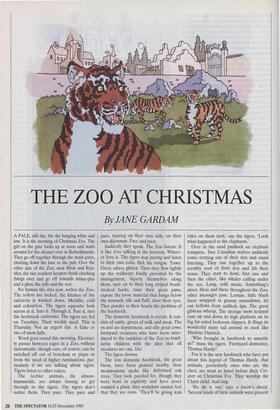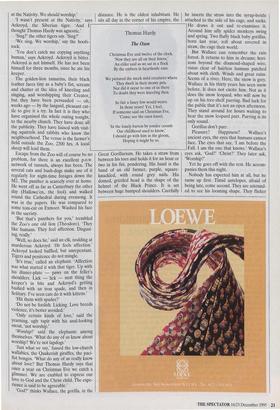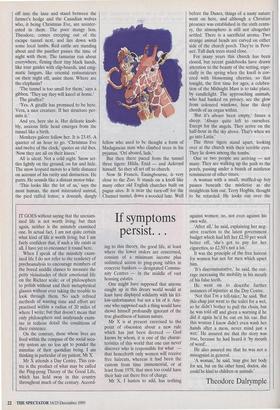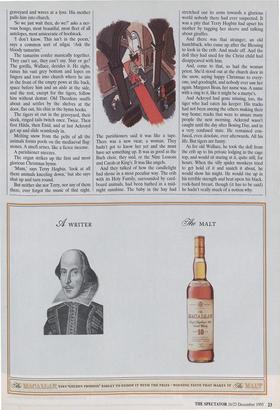THE ZOO AT CHRISTMAS
By JANE GARDAM
A PALE, still day, the sky hanging white and low. It is the morning of Christmas Eve. The girl on the gate locks up at noon and waits around for the cleaner over in Refreshments. They go off together through the main gates, chatting down the lane to the pub. Over the other side of the Zoo, near Birds and Rep- tiles, the two resident keepers finish checking things over and go off towards mince-pies and a glass, the telly and the tree.
No human life stirs now, within the Zoo. The toilets are locked, the kitchen of the cafeteria is washed down. Metallic, cold and colourless. The tigers opposite look across at it. Into it. Through it. Past it, into the hoofstock enclosure. The tigers are fed on Tuesdays. Their weekly meal. This is Thursday. Not an urgent day. A flake or two of snow falls.
Word goes round this morning. Electrici- ty passes between cages in a Zoo, without instruments, though ears, of course, can be switched off out of boredom or pique or from the need of higher ruminations, par- ticularly if we are talking about tigers. Tigers listen to other voices.
The feebler animals, the almost- humanoids, are always fussing to get through to the tigers. The tigers don't notice them. They pace. They pace and pace, turning on their own tails, on their own dilemmas. Pace and pace.
Suddenly they speak. The Zoo listens. It is like Jove talking in the heavens. Whoev- er Jove is. The tigers stop pacing and listen to their own echo, flick the tongue. Yawn. Great sabres glisten. Then they flow lightly up the walkways kindly provided by the management, liquefy themselves along them, turn on to their long striped brush- stroked backs, raise their great paws, expose the loose material that hangs below the stomach, silk and fluff, close their eyes. They ponder in their hearts the problem of the hoofstock.
The domestic hoofstock is recent. It con- sists of cattle, givers of milk and meat. The ox and ass department, and silly great cows; farmyard creatures who have been intro- duced to the outskirts of the Zoo to famil- iarise children with the idea that all creatures are one. Ha!
The tigers drowse.
The less domestic hoofstock, the great bison, have been penned nearby, their mountainous necks like deformed oak trees. They look puzzled for, though they were born in captivity and have never roamed a plain, they somehow cannot feel that they are cows. 'They'll be giving kids rides on them next,' say the tigers. 'Look what happened to the elephants.'
Over in the sand paddock an elephant trumpets. Two Canadian wolves suddenly come trotting out of their den and stand listening. They run together up to the scrubby roof of their den and lift their noses. They start to howl, first one and then the other, like whales calling under the sea. Long, cold music. Something's afoot. Here and there throughout the Zoo, other messages pass. Lemurs, little black faces wrapped in granny swansdown, let out bellows from unlikely lips. The great gibbons whoop. The strange snow leopard runs up and down its high platform on its big fur-soled bedroom slippers. It flings its wonderful misty tail around its neck like Marlene Dietrich.
`Who brought in hoofstock to unsettle us?' muse the tigers. 'Farmyard domestics. Thomas Hardy!'
For it is the new hoofstock who have put about this legend of Thomas Hardy, that animals, particularly oxen who are the elect, are wont to kneel before their Cre- ator on Christmas Eve. They worship the Christ child. And sing.
`We do it, too,' says a Jacob's sheep. `Several kinds of farm animals were present at the Nativity. We should worship.'
`I wasn't present at the Nativity,' says Ackroyd, the Siberian tiger. 'And I thought Thomas Hardy was agnostic.' `Sing?' the other tigers say. 'Sing?'
`We sing. We worship,' say the hoofs- tock.
`You don't catch me copying anything human,' says Ackroyd, Ackroyd is bitter. Ackroyd is not himself. He has not been himself for three months, since he ate his keeper.
The golden-lion tamarins, their black leather faces tiny as a baby's fist, scream and chatter at the idea of kneeling and singing, and worshipping their Creator, but they have been persuaded — oh, weeks ago — by the languid, pleasant cat- tle to give it a try. In fact it is they who have organised the whole outing tonight, to the nearby church. They have done all the publicity. They have liaised with visit- ing squirrels and rabbits who know the neighbourhood. The venue is the farmer's field outside the Zoo, 2300 hrs. A local sheep will lead them.
Escape from the Zoo will of course be no problem, for there is an excellent p.o.w. network of tunnels, always has been. The several cats and bush-dogs make use of it regularly for night-time forages down the M2. The panther is scarcely ever at home. He went off as far as Canterbury the other day (Hallowe'en, the fool) and walked round the Cathedral during evensong. It was in the papers. He was compared to some tom-cat on Exmoor. Washed his face in the sacristy. `But that's panthers for you,' trembled the Zoo's one old lion (Theodore). 'They like humans. They feel affection. Disgust- ing, really.' `Well, so does he,' said an elk, nodding at murderous Ackroyd. 'He feels affection.' Ackroyd looked baffled, but unrepentant. Tigers and penitence do not mingle. `It's true,' called an elephant. 'Affection was what started it with that tiger. Up with his dinner-plate — paws on the feller's shoulders. Lick — lick — next thing the keeper's in bits and Ackroyd's getting bashed with an iron spade, and then in Solitary. I've seen cats do it with kittens.'
`Hit them with spades?' `Do not be foolish. Licking. Love breeds violence, it's better avoided.'
`Only certain kinds of love,' said the yearning, ugly tapir with his anal-looking snout, 'not worship.'
`Worship!' said the elephants among themselves. 'What do any of us know about worship? We're not lapdogs.'
`Just what we say,' fussed the low-church wallabies, the Quakerish giraffes, the paci- fist bongos. 'What do any of us really know about love? But Thomas Hardy says that once a year on Christmas Eve we catch a glimmer. We are enabled to express our love to God and the Christ child. The expe- rience is said to be agreeable.'
`God?' thinks Wallace, the gorilla, in the distance. He is the oldest inhabitant. He sits all day in the corner of his empire, the Great Gorillarium. He takes a straw from between his toes and holds it for an hour or two in his fist, pondering. His hand is the hand of an old farmer, purple, square- knuckled, with round grey nails. His domed, grizzled head is the shape of the helmet of the Black Prince. It is set between huge humped shoulders. Carefully he inserts the straw into the syrup-bottle attached to the side of his cage, and sucks. He draws it out and re-examines it. Around him silly spider monkeys swing and spring. Two fluffy black baby gorillas, born last year, roll about covered in straw, the cage their world.
But Wallace can remember the rain forest. It returns to him in dreams; hori- zons beyond the diamond-shaped wire, vistas clear of hairless humans patched about with cloth. Winds and great rains. Scents of a river. Here, the snow is grey. Wallace in his thirty years has seen snow before. It does not excite him. Not as it does the snow leopard, who will now be up on his tree-shelf purring. Bad luck for the public that it's not an open afternoon. They stand around for hours waiting to hear the snow leopard purr. Purring is its only sound.
Gorillas don't purr.
Pleasure? Happiness? Wallace's ancient eyes, the eyes that humans cannot face. The eyes that say, 'I am before the Fall. I am the one that knows.' Wallace's eyes ask, `God?' Christ?' They later ask, `Worship?'
Yet he goes off with the rest. He accom- panies them this night.
Nobody has expected him at all, but he turns up first. Timid antelopes, afraid of being late, come second. They are astound- ed to see his looming shape. They flicker off into the lane and stand between the farmer's hedge and the Canadian wolves who, it being Christmas Eve, are uninter- ested in them. The poor mangy lion, Theodore, comes creeping out of the escape tunnel next, and lies down with some local lambs. Red cattle are standing about and the panther passes the time of night with them. The tamarins run about everywhere, flexing their tiny black hands, like tour guides with clip-boards, and enig- matic langurs, like oriental restaurateurs on their night off, assist them. Where are the elephants?
`The tunnel is too small for them,' says a gibbon. 'They say they will kneel at home.' The giraffes?
`Yes. A giraffe has promised to be here. Vera, a nice creature. If her structure per- mits it.'
And yes, here she is. Her delicate knob- bly, anxious little head emerges from the tunnel like a birth.
Monkeys galore follow her. It is 23.45. A quarter of an hour to go. 'Christmas Eve and twelve of the clock,' quotes an old ibex. `Now they are all on their knees.'
All is silent. Not a cold night. Snow set- tles lightly on the ground, on fur and hide. The snow leopard moves to a little distance on account of his rarity and distinction. He purrs. He sounds like a distant motor-bike.
`This looks like the lot of us,' says the most human, the most mistrusted animal, the pied ruffed lemur, a donnish, dangly fellow who used to be thought a form of Madagascan man who climbed trees in his pyjamas. 'Or' aboard, lads.'
But then there paced from the tunnel three tigers: Hilda, Enid — and Ackroyd himself. So they all set off to church.
Now St Francis, Easingbourne, is very close to the Zoo. It stands on a knoll like many other old English churches built on pagan sites. It is near the turn-off for the Channel tunnel, down a wooded lane. Well before the Danes, things of a nasty nature went on here, and although a Christian presence was established in the sixth centu- ry, the atmosphere is still not altogether settled. There is a sacrificial aroma. Two strange animal heads are carved on either side of the church porch. They're in Pevs- ner. Tall dark trees stand close.
For many years this church has been closed, but recent guidebooks have drawn attention to the beauty of the setting, espe- cially in the spring when the knoll is cov- ered with blossoming cherries, so that tonight, the first time for ages, a celebra- tion of the Midnight Mass is to take place, by candlelight. The approaching animals, who had banked on privacy, see the glow from coloured windows, hear the deep chords of an organ within.
`But it's always been empty,' fusses a sheep. 'Always quite left to ourselves. Except for the angels. They arrive on the half-hour in the sky above. That's when we go into Latin.'
The three tigers stand apart, looking over at the church with their terrible eyes. They lie down among the tombs.
One or two people are arriving — not many. They are walking up the path to the porch, passing under a bunch of mistletoe reminiscent of other times.
A woman with a small, muffled-up boy pauses beneath the mistletoe as she straightens him out. Terry Hogbin, thought to be retarded. He looks out over the graveyard and waves at a lynx. His mother pulls him into church.
`So we just wait then, do we?' asks a ner- vous bongo, most beautiful, most fleet of all antelopes, most aristocratic of hoofstock.
`I don't know. This isn't in the poem,' says a common sort of nilgai. 'Ask the bloody tamarins.'
The tamarins confer manically together. They can't say, they can't say. Stay or go? The gorilla, Wallace, decides it. He sighs, raises his vast grey bottom and lopes on fingers and toes into church where he sits in the front of the empty pews at the back, space before him and an aisle at the side, and the rest, except for the tigers, follow him without demur. Old Theodore snuffs about and settles by the shelves at the door, flat out, his chin in the hymn books.
The tigers sit out in the graveyard, their sleek, ringed tails twitch once. Twice. Then first Hilda, then Enid, and at last Ackroyd get up and slide seamlessly in.
Melting snow from the pelts of all the animals forms pools on the mediaeval flag- stones. A smell arises, like a fierce incense.
A parishioner sneezes.
The organ strikes up the first and most glorious Christmas hymn.
`Mum,' says Terry Hogbin, 'look at all them animals kneeling down,' but she says shut up and turn round.
But neither she nor Terry, nor any of them there, ever forgot the music of that night. The parishioners said it was like a tape. There was a new vicar, a woman. They hadn't got to know her yet and she must have set something up. It was as good as the Bach choir, they said, or the Nine Lessons and Carols at King's. It was like angels.
And they talked of how the candlelight had shone in a most peculiar way. The crib with its Holy Family, surrounded by card- board animals, had been bathed in a mid- night sunshine. The baby in the hay had stretched out its arms towards a glorious world nobody there had ever suspected. It was a pity that Terry Hogbin had upset his mother by tugging her sleeve and talking about giraffes.
And there was that stranger, an old hunchback, who came up after the Blessing to look in the crib. And made off. And the doll they had used for the Christ child had disappeared with him.
And, come to that, so had the woman priest. She'd stood out at the church door in the snow, saying happy Christmas to every- one, and goodnight, and nobody ever saw her again. Margaret Bean, her name was. A name with a ring to it, like it might be a martyr's.
And Ackroyd had gone missing, too, the tiger who had eaten his keeper. His tracks had not been among the others making their way home; tracks that were to amaze many people the next morning. Ackroyd wasn't caught until the day after Boxing Day, and in a very confused state. He remained con- fused, even desolate, ever afterwards. All his life. But tigers are funny.
As for old Wallace, he took the doll from the crib up to his private lodging in the cage top, and would sit staring at it, quite still, for hours. When the silly spider monkeys tried to get hold of it and snatch it about, he would show his might. He would rise up in his terrible strength and beat upon his black, rock-hard breast, though (it has to be said) he hadn't really much of a notion why.













































































































 Previous page
Previous page